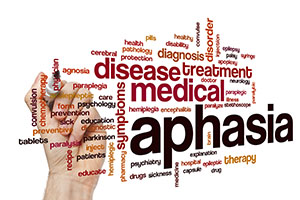


Aphasia is a communication disorder that results from damage to the parts of the brain that contain language (typically in the left half of the brain). Aphasia may cause difficulties in speaking, listening, reading, and writing, but does not affect intelligence and is mostly characterized by what's called Anomia(inability to name objects). Damage to the right side of the brain causes cognitive-linguistic deficits, attention and concentration, memory, judgment, reasoning, pragmatics. Aphasia is often be co-morbid with additional communication disorders such as dysarthria (motor speech disorder involves weakness that impede appropriate production of sounds etc), apraxia (motor planning secondary to parts of the brain that have been damaged), or dysphagia (swallowing).
Ms. King is well-experienced in working with individuals with Aphasia due to stroke and is an advocate and educator. Most recently, Ms. King lectured at the National Stroke Consortium, sponsored by the American Heart Association, and her article, "Individualizing Speech Therapy Goals in a Group Setting," was recently published in StrokeSmart, among others. She is also presently conducting workshops, training allied health professionals including physical therapists and occupational therapists how to work with brain-injured adults and children.
Ms. King provides a functional and effective approach to working with individuals with aphasia, and is skilled not only in facilitating language and communication, but in teaching strategies for both the patient and the caregiver to use.


